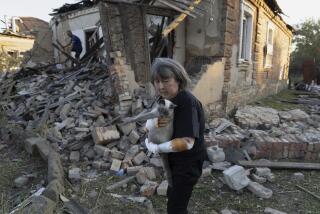Strike--or Face Another Bosnia
- Share via
Three years after the Dayton Accords ended the fighting in Bosnia, Slobodan Milosevic is back at it again. This time, his forces are in Kosovo, driving out and killing Albanian men, women and children--even as he meets with diplomats and moderate Kosovar leaders.
If the world does not heed the lessons of Bosnia and act forcefully now, Kosovo’s 2 million Albanians will fare much worse than their Bosnian neighbors.
In early summer 1995, Congress voted overwhelmingly to lift the arms embargo on Bosnia. This was a bipartisan effort that signaled congressional support for stopping Serbian aggression. The price of that genocidal aggression had been the slaughter of 250,000 Bosnians and the displacement of 2.5 million people. Congressional action prompted the Clinton administration to move forward and lead NATO’s conduct of air strikes against Serbian targets, which in turn brought Serbia’s President Milosevic to the negotiating table in Dayton.
The time for prevention has come and gone. The opportunity to resolve the status of Kosovo at Dayton was missed. Kosovo is now at war. Immediate and resolute actions must be taken to stop the conflict that is escalating daily. NATO’s accelerated military planning and recent military exercises in the region are steps in the right direction.
Nevertheless, we are gravely concerned that these moves will not be enough to prevent a Bosnia-style human tragedy and possibly a regionwide expansion of the violence and refugees beyond Kosovo. Experience with the aggression against Bosnia yielded two very important lessons. First, Milosevic responded only to the credible threat and use of force. Second, the longer we wait to take action, the more difficult it becomes to alter events on the ground. We must act now or deal with the increasingly deadly consequences later.
With those lessons in mind, we urge the president, once again, to lead our allies and take three immediate actions: Deliver an ultimatum to Milosevic. If he does not halt the attacks on Kosovo, if he does not agree to participate in internationally mediated talks, NATO will conduct air strikes against military installations in Serbia.
Then, establish a NATO no-fly zone over Kosovo, which, if violated, will be met with swift and decisive military retribution.
Third, extend the sanctions imposed on Serbia, including a comprehensive economic and fuel embargo. Economic and energy sanctions must be imposed in conjunction with NATO actions.
The crisis in Kosovo also demands immediate humanitarian aid. But the origin of the crisis in Kosovo is not humanitarian. It is the culmination of a decade of Serbian denial of the human and political rights of the Albanian majority in Kosovo.
In light of years long Albanian suffering, it is no surprise that some Albanians have become impatient with nonviolent resistance and support the Kosovo Liberation Army.
As the U.S. experience in Bosnia demonstrated, negotiations that are not backed by the credible threat of force will not succeed. Unless the world forces Milosevic to cease his attacks and accept international mediation, the conflict that has already begun will be worse than Bosnia not only for the Kosovars, but also for Europe, NATO and the United States.
More to Read
Sign up for Essential California
The most important California stories and recommendations in your inbox every morning.
You may occasionally receive promotional content from the Los Angeles Times.










